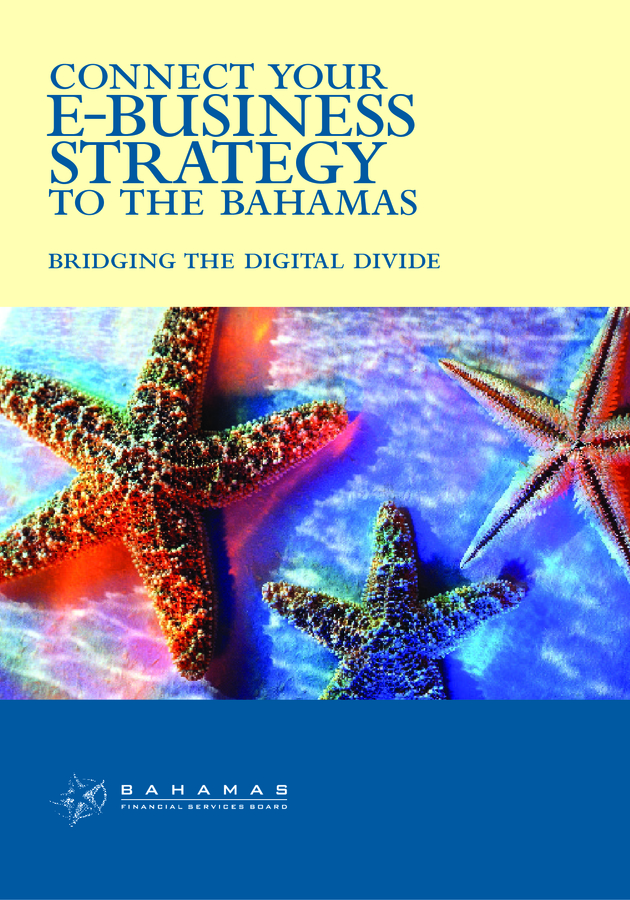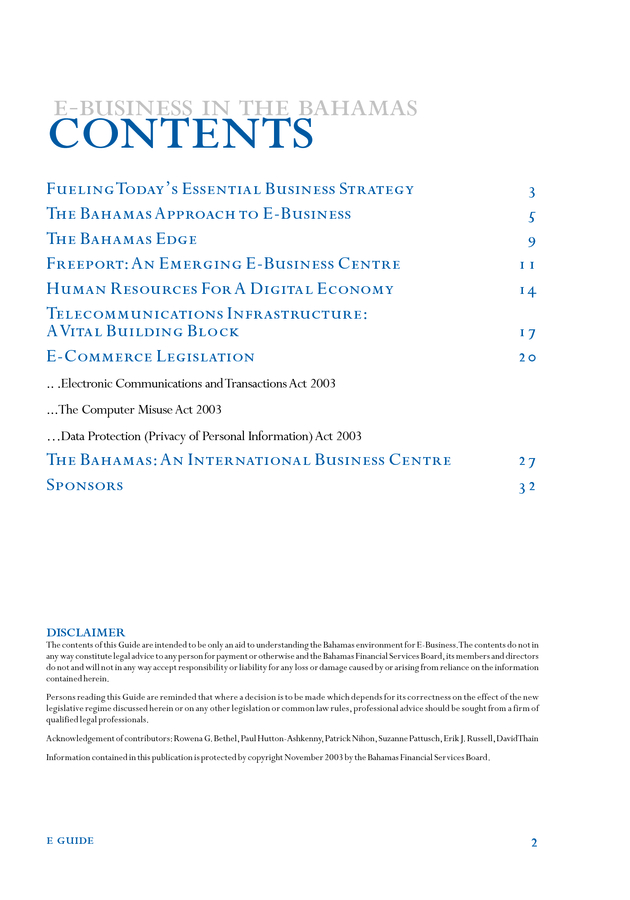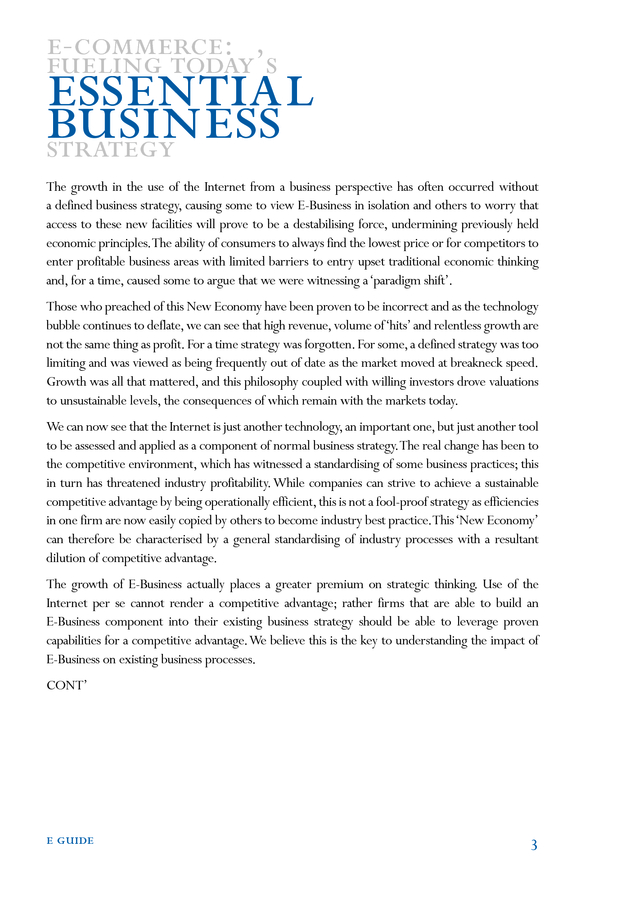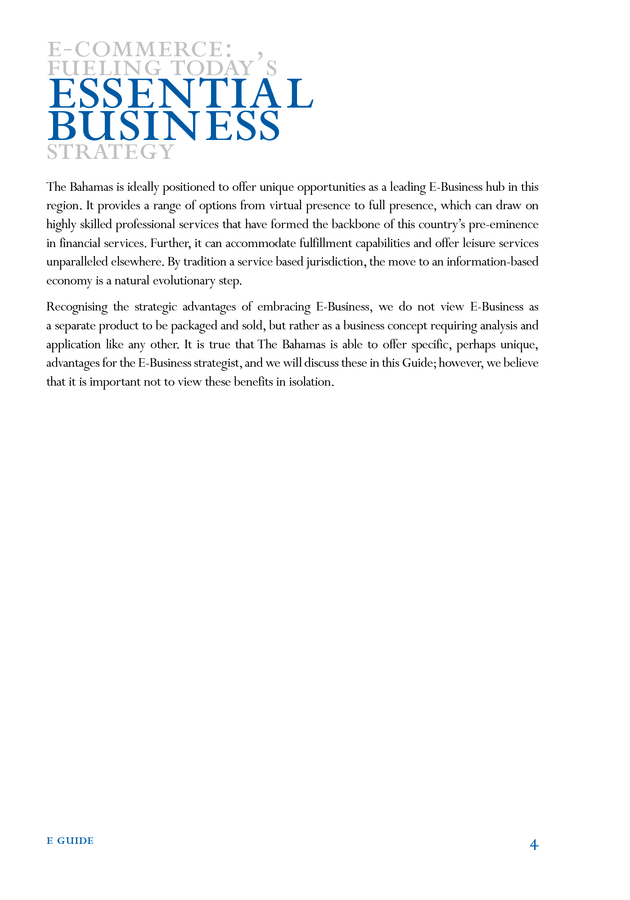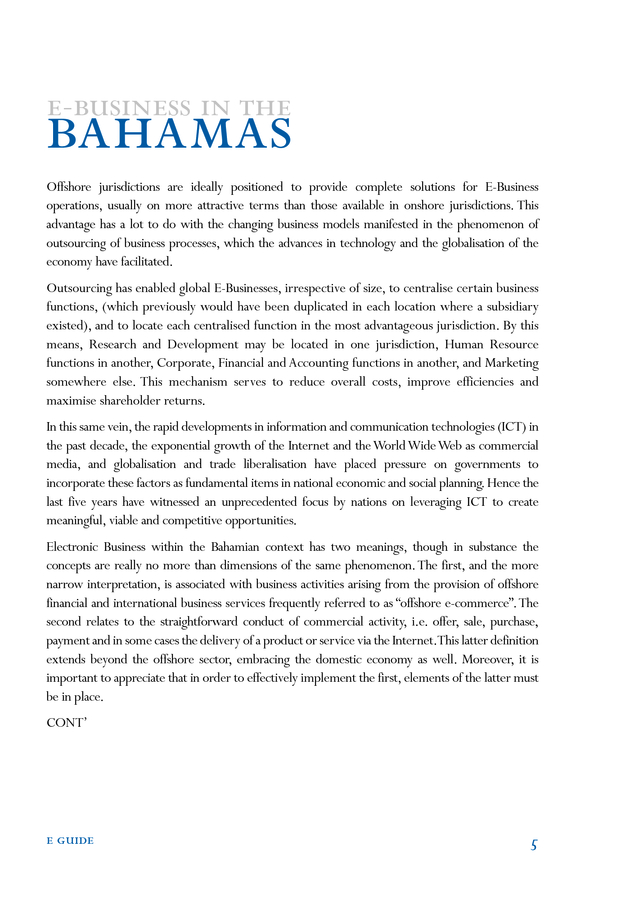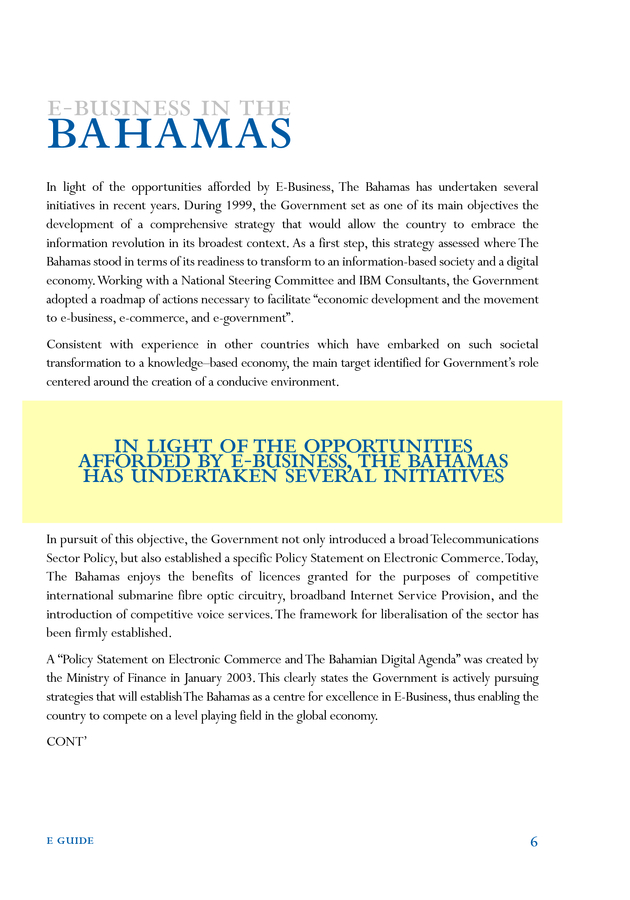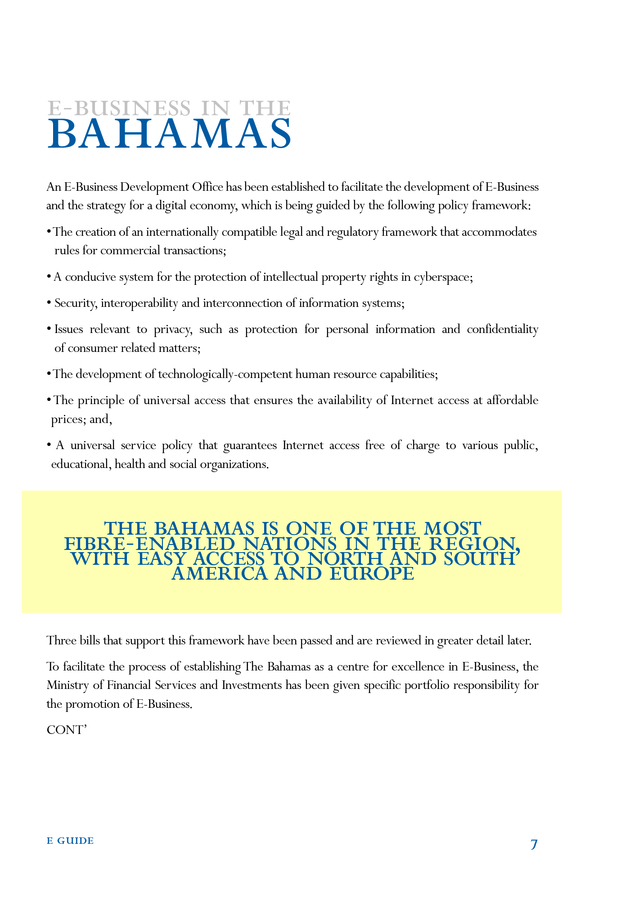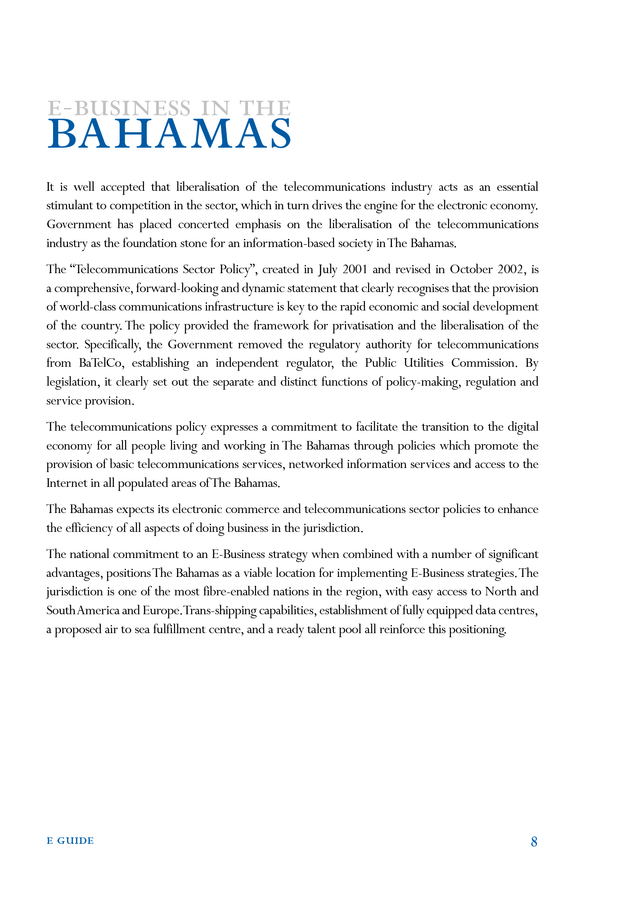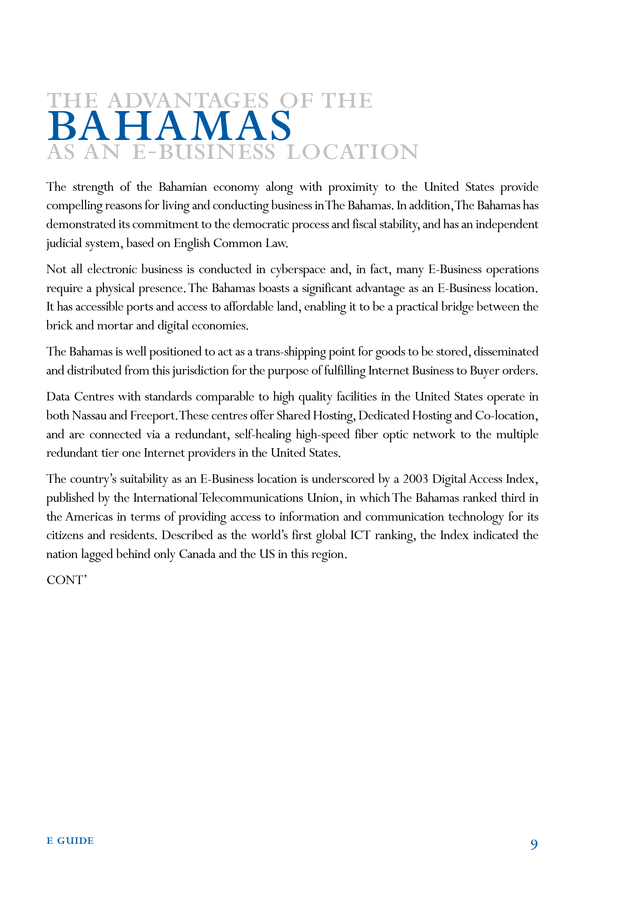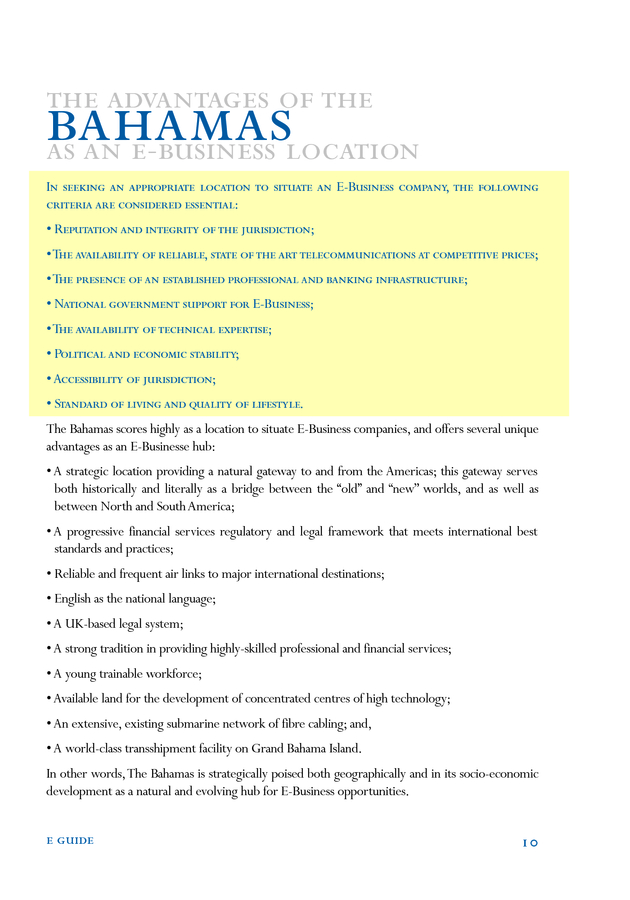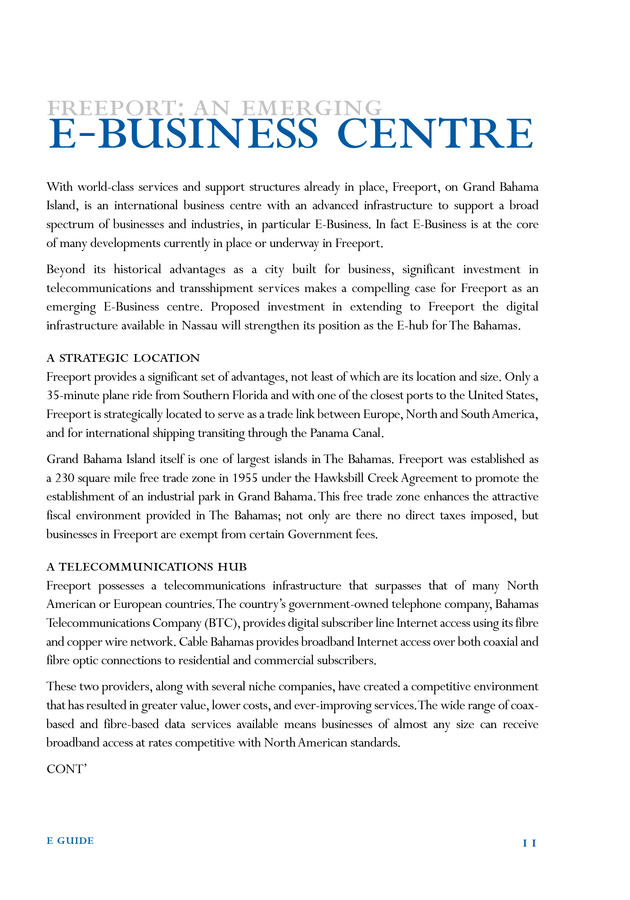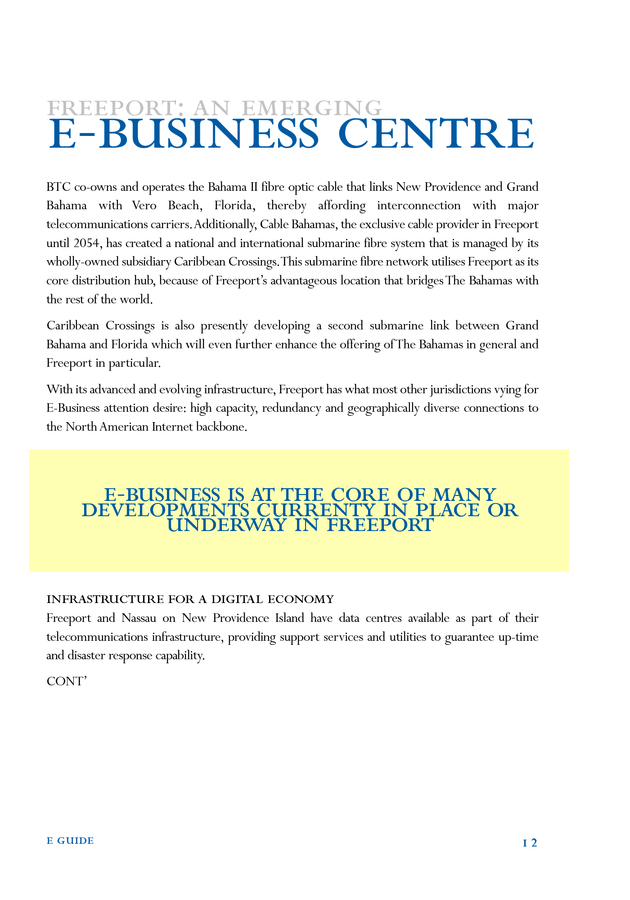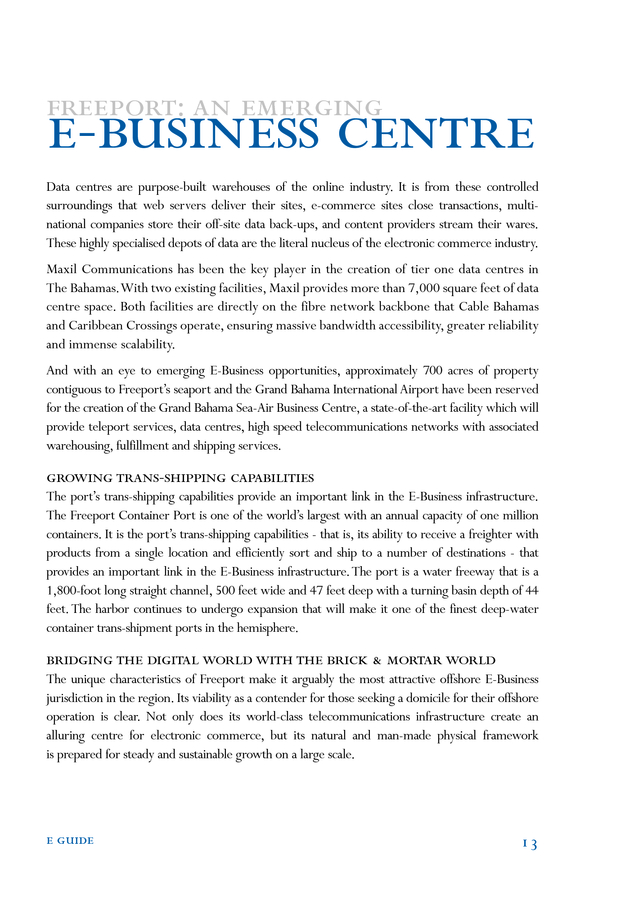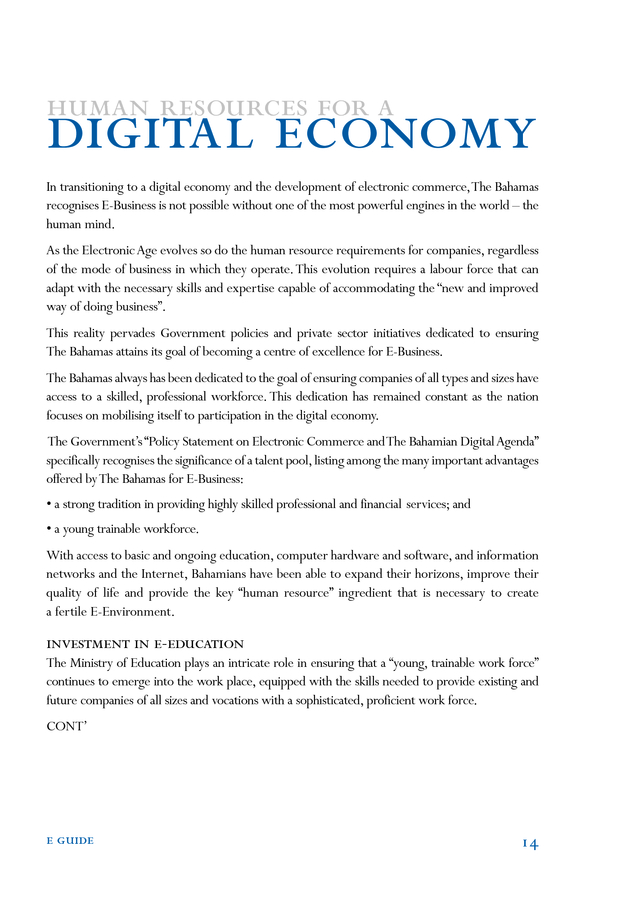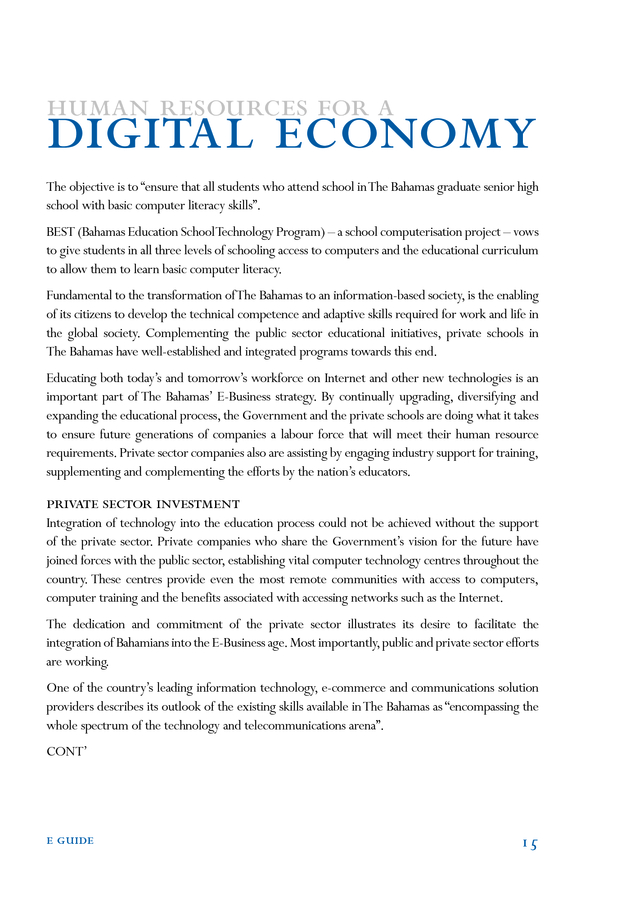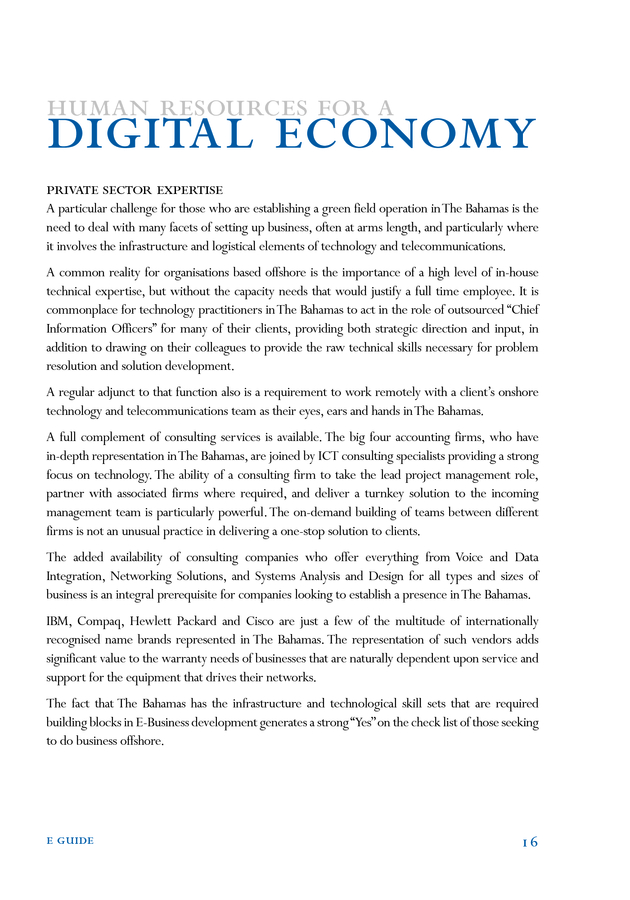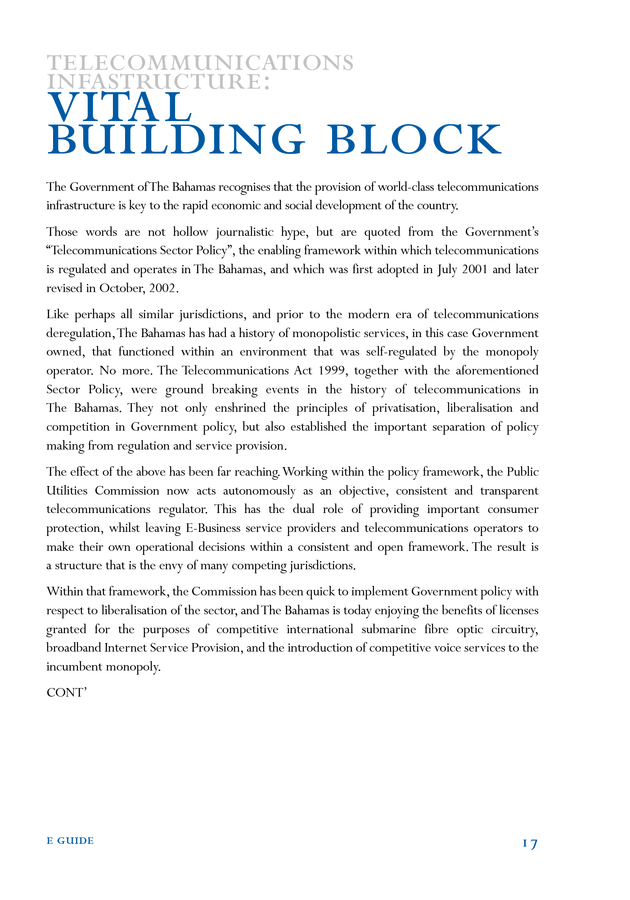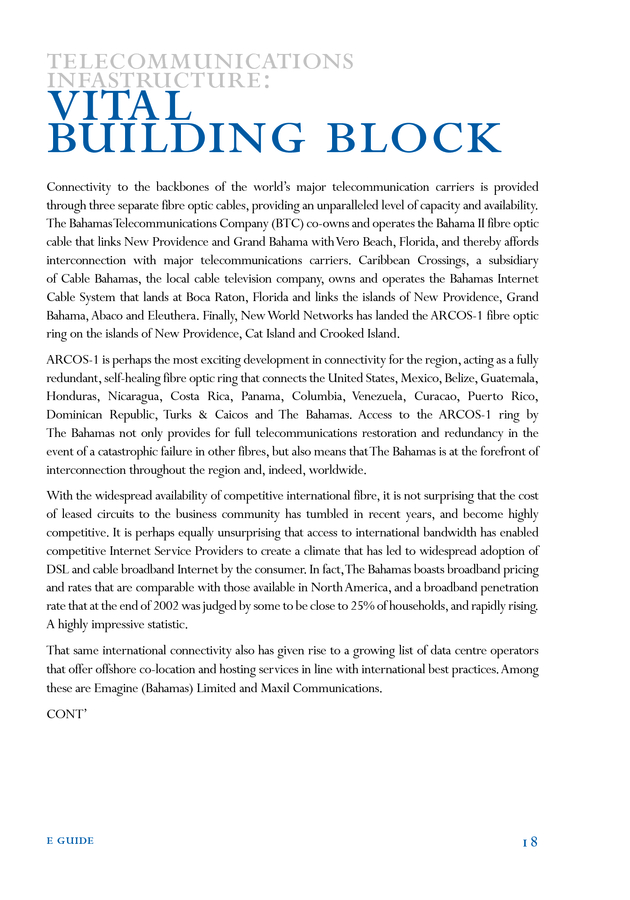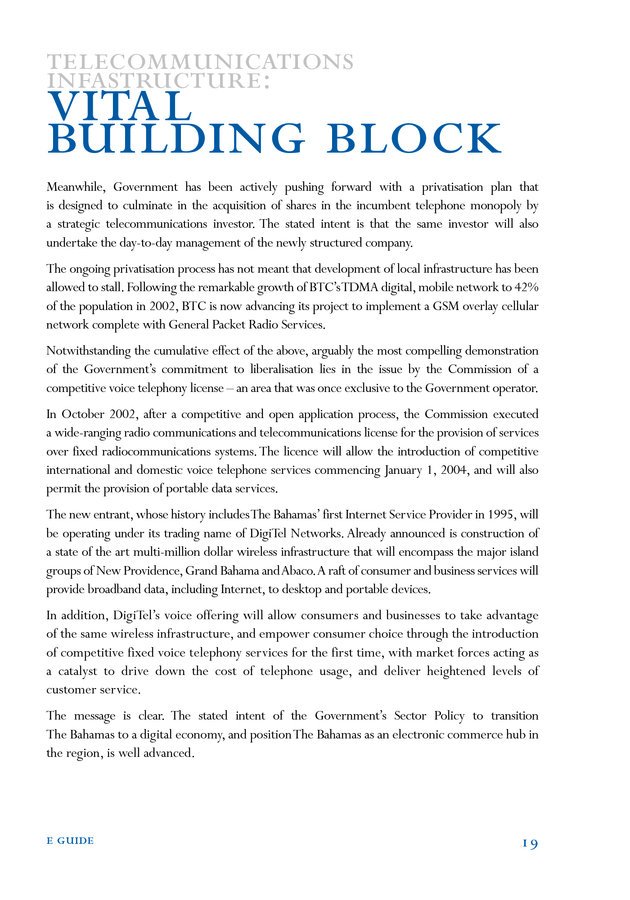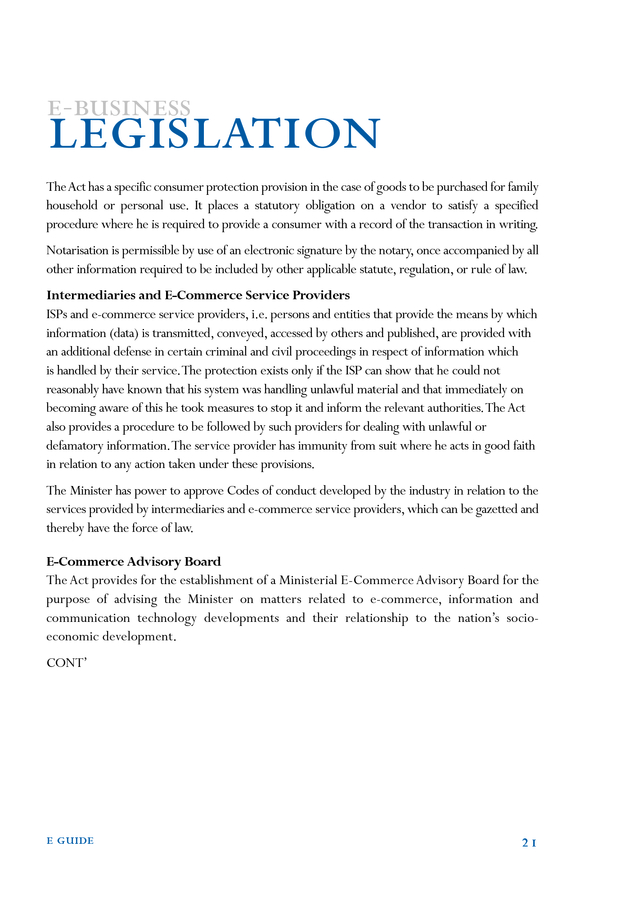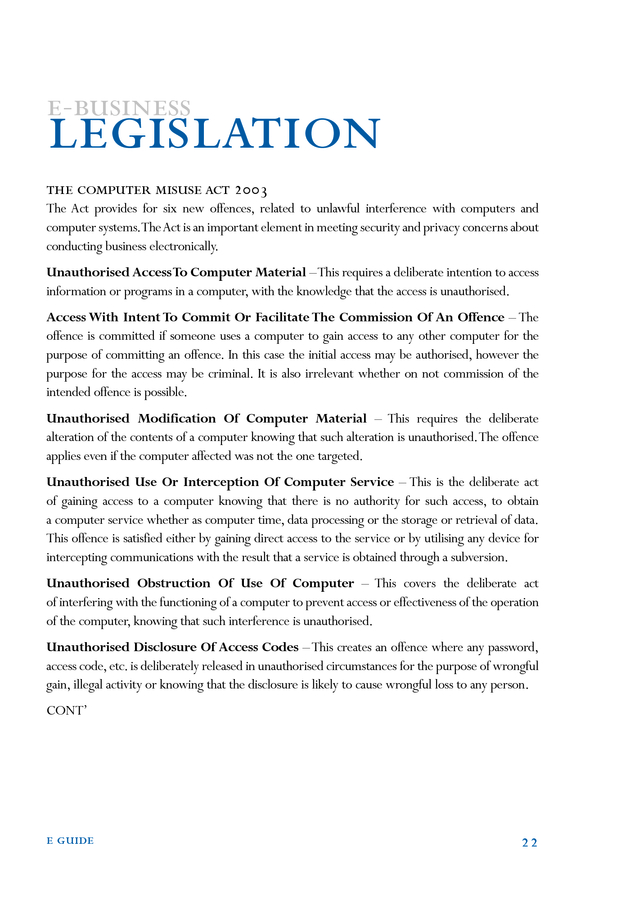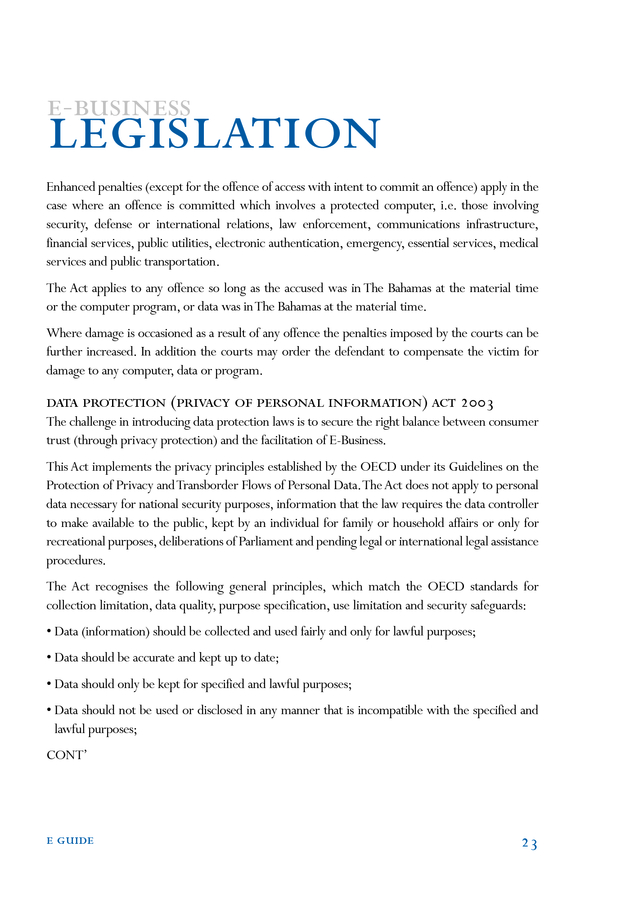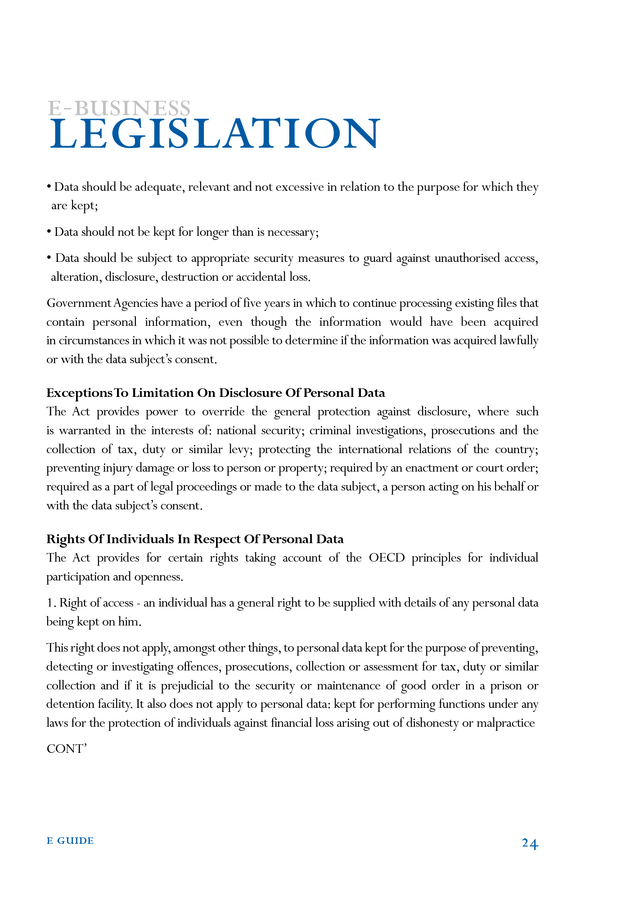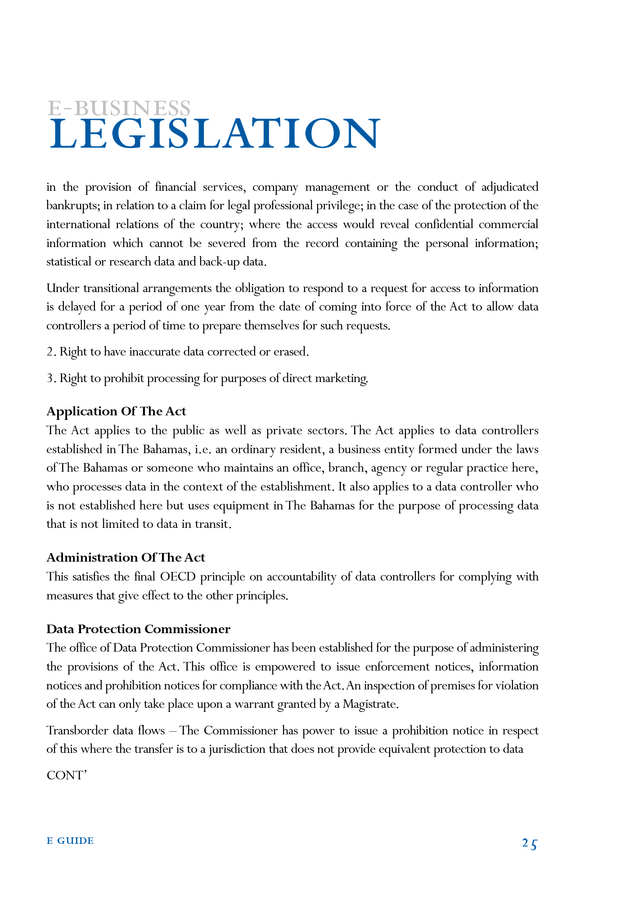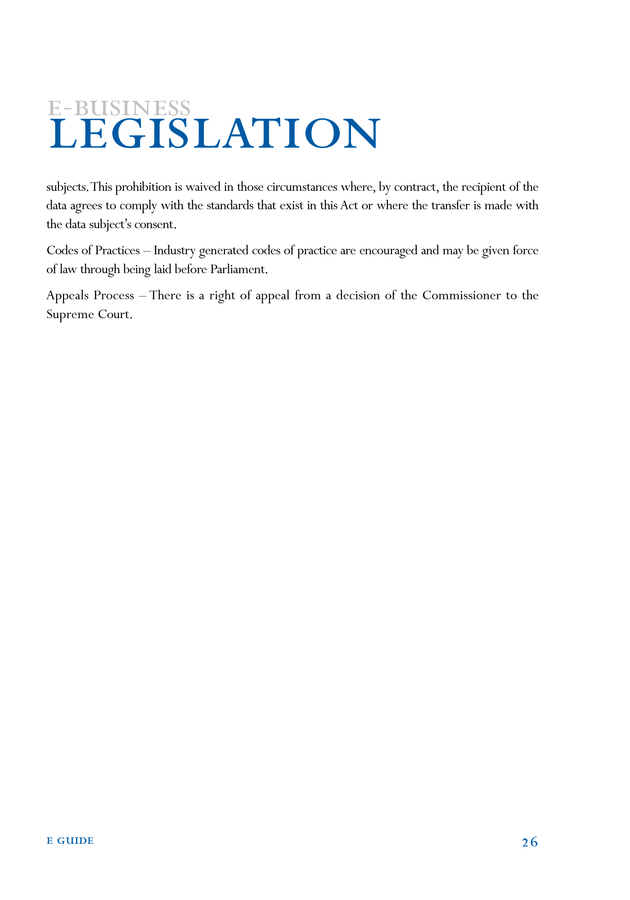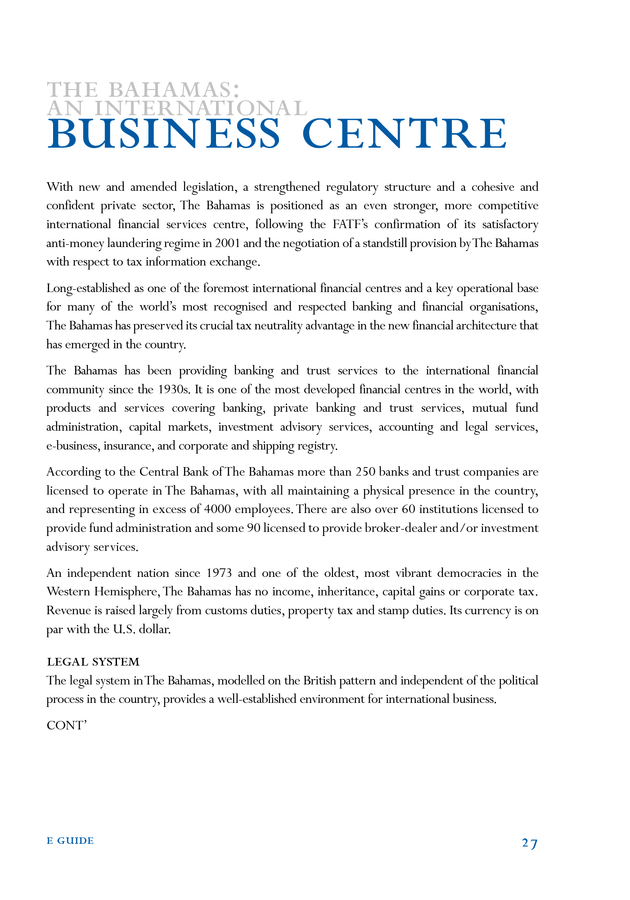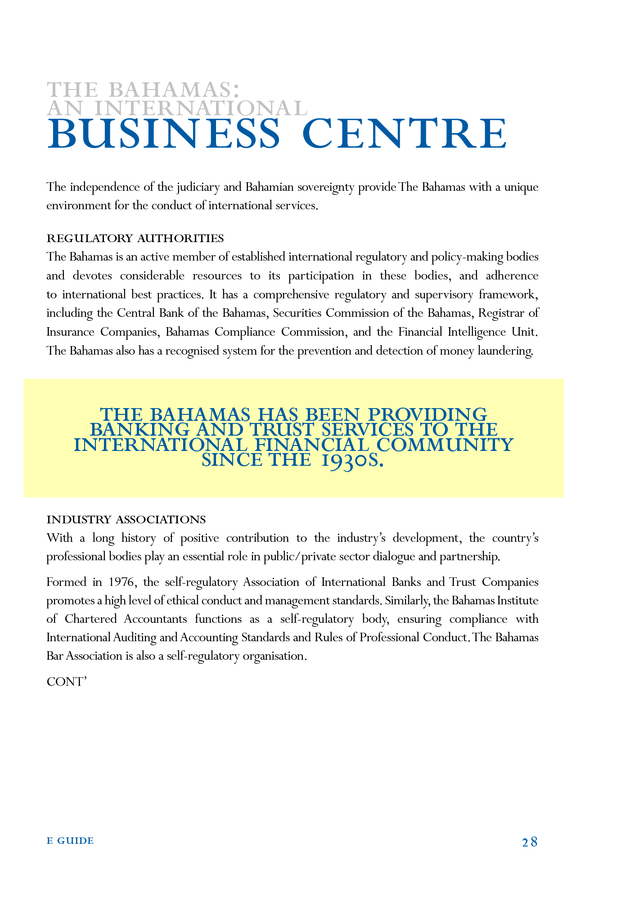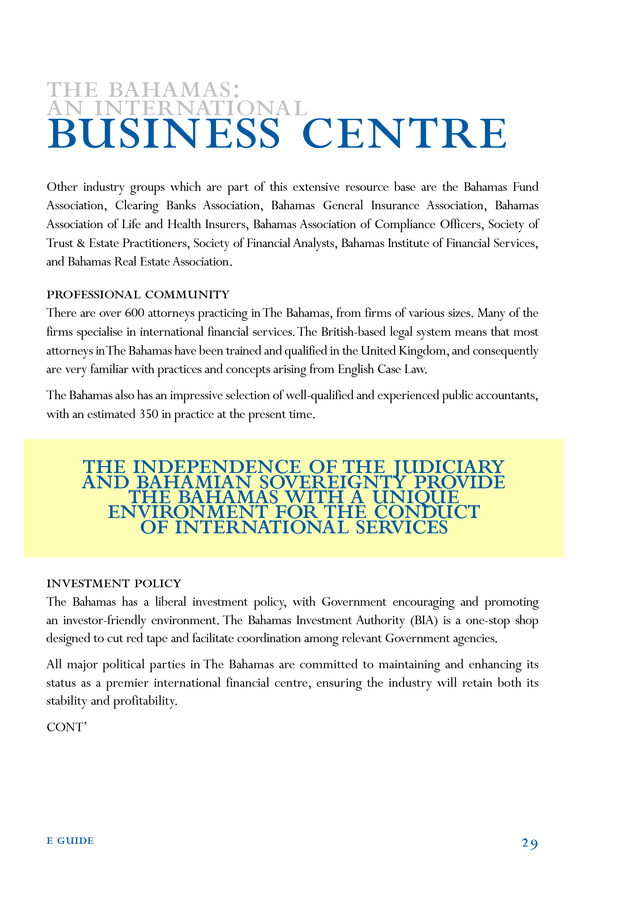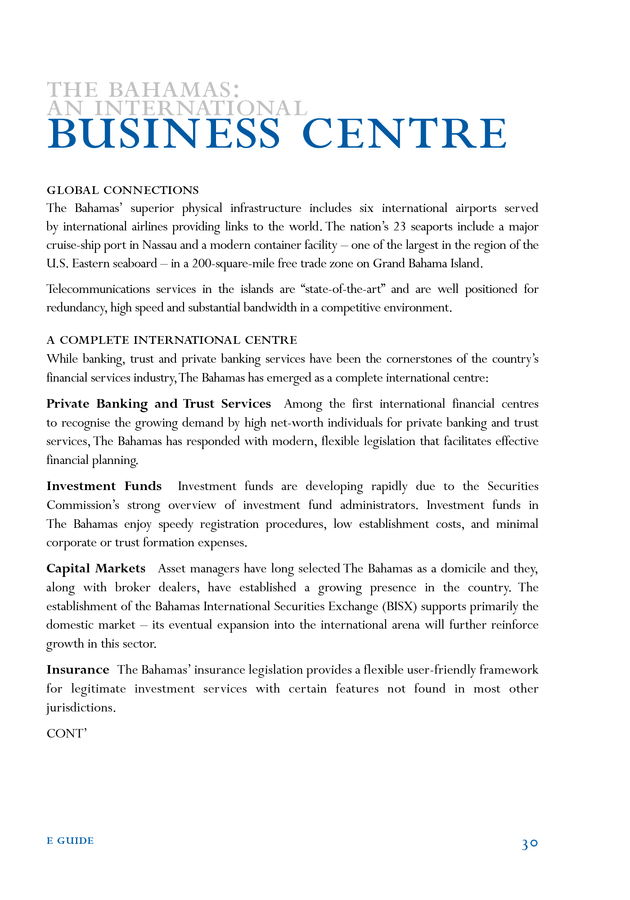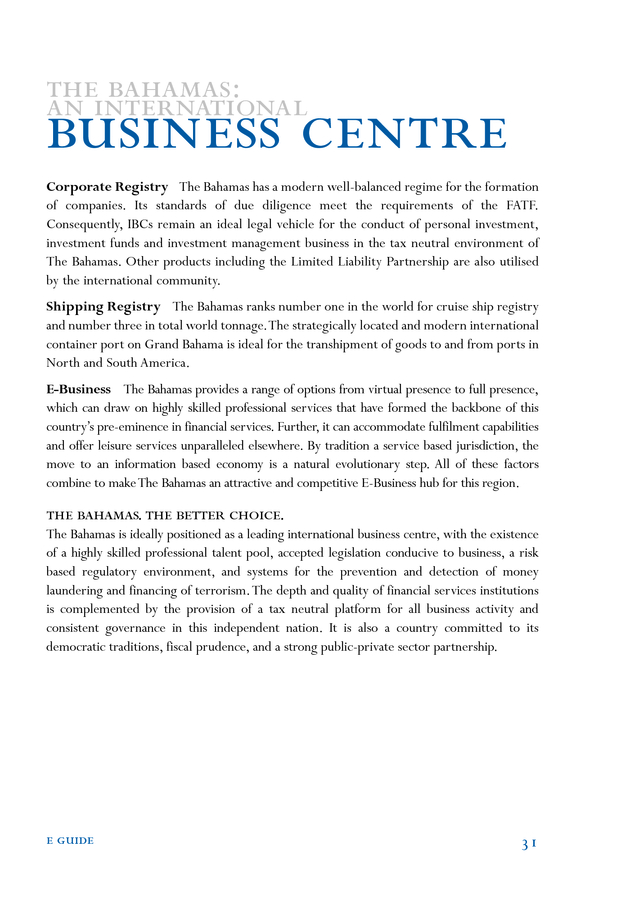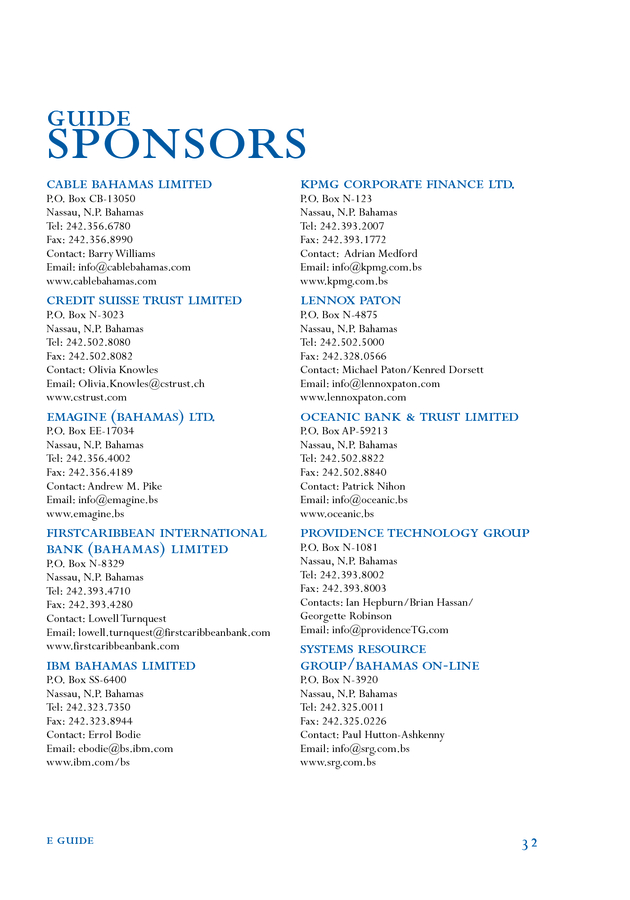




1) connect your e-business strategy to the bahamas bridging the digital divide
2) e-business in the bahamas contents Fueling Today’s Essential Business Strategy The Bahamas Approach to E-Business The Bahamas Edge Freeport:An Emerging E-Business Centre Human Resources For A Digital Economy Telecommunications Infrastructure: A Vital Building Block E-Commerce Legislation 3 5 9 11 14 17 20 .. .Electronic Communications and Transactions Act 2003 ...The Computer Misuse Act 2003 …Data Protection (Privacy of Personal Information) Act 2003 The Bahamas:An International Business Centre Sponsors 27 32 disclaimer The contents of this Guide are intended to be only an aid to understanding the Bahamas environment for E-Business.The contents do not in any way constitute legal advice to any person for payment or otherwise and the Bahamas Financial Services Board,its members and directors do not and will not in any way accept responsibility or liability for any loss or damage caused by or arising from reliance on the information contained herein. Persons reading this Guide are reminded that where a decision is to be made which depends for its correctness on the effect of the new legislative regime discussed herein or on any other legislation or common law rules, professional advice should be sought from a firm of qualified legal professionals. Acknowledgement of contributors:Rowena G.Bethel,Paul Hutton-Ashkenny,Patrick Nihon,Suzanne Pattusch,Erik J.Russell,DavidThain Information contained in this publication is protected by copyright November 2003 by the Bahamas Financial Services Board. e guide 2
3) e-commerce: fueling today’s essential business strategy The growth in the use of the Internet from a business perspective has often occurred without a defined business strategy, causing some to view E-Business in isolation and others to worry that access to these new facilities will prove to be a destabilising force, undermining previously held economic principles.The ability of consumers to always find the lowest price or for competitors to enter profitable business areas with limited barriers to entry upset traditional economic thinking and, for a time, caused some to argue that we were witnessing a ‘paradigm shift’. Those who preached of this New Economy have been proven to be incorrect and as the technology bubble continues to deflate, we can see that high revenue, volume of ‘hits’ and relentless growth are not the same thing as profit. For a time strategy was forgotten. For some, a defined strategy was too limiting and was viewed as being frequently out of date as the market moved at breakneck speed. Growth was all that mattered, and this philosophy coupled with willing investors drove valuations to unsustainable levels, the consequences of which remain with the markets today. We can now see that the Internet is just another technology, an important one, but just another tool to be assessed and applied as a component of normal business strategy.The real change has been to the competitive environment, which has witnessed a standardising of some business practices; this in turn has threatened industry profitability. While companies can strive to achieve a sustainable competitive advantage by being operationally efficient, this is not a fool-proof strategy as efficiencies in one firm are now easily copied by others to become industry best practice.This ‘New Economy’ can therefore be characterised by a general standardising of industry processes with a resultant dilution of competitive advantage. The growth of E-Business actually places a greater premium on strategic thinking. Use of the Internet per se cannot render a competitive advantage; rather firms that are able to build an E-Business component into their existing business strategy should be able to leverage proven capabilities for a competitive advantage.We believe this is the key to understanding the impact of E-Business on existing business processes. CONT’ e guide 3
4) e-commerce: fueling today’s essential business strategy The Bahamas is ideally positioned to offer unique opportunities as a leading E-Business hub in this region. It provides a range of options from virtual presence to full presence, which can draw on highly skilled professional services that have formed the backbone of this country’s pre-eminence in financial services. Further, it can accommodate fulfillment capabilities and offer leisure services unparalleled elsewhere. By tradition a service based jurisdiction, the move to an information-based economy is a natural evolutionary step. Recognising the strategic advantages of embracing E-Business, we do not view E-Business as a separate product to be packaged and sold, but rather as a business concept requiring analysis and application like any other. It is true that The Bahamas is able to offer specific, perhaps unique, advantages for the E-Business strategist, and we will discuss these in this Guide; however, we believe that it is important not to view these benefits in isolation. e guide 4
5) e-business in the bahamas Offshore jurisdictions are ideally positioned to provide complete solutions for E-Business operations, usually on more attractive terms than those available in onshore jurisdictions. This advantage has a lot to do with the changing business models manifested in the phenomenon of outsourcing of business processes, which the advances in technology and the globalisation of the economy have facilitated. Outsourcing has enabled global E-Businesses, irrespective of size, to centralise certain business functions, (which previously would have been duplicated in each location where a subsidiary existed), and to locate each centralised function in the most advantageous jurisdiction. By this means, Research and Development may be located in one jurisdiction, Human Resource functions in another, Corporate, Financial and Accounting functions in another, and Marketing somewhere else. This mechanism serves to reduce overall costs, improve efficiencies and maximise shareholder returns. In this same vein, the rapid developments in information and communication technologies (ICT) in the past decade, the exponential growth of the Internet and the World Wide Web as commercial media, and globalisation and trade liberalisation have placed pressure on governments to incorporate these factors as fundamental items in national economic and social planning. Hence the last five years have witnessed an unprecedented focus by nations on leveraging ICT to create meaningful, viable and competitive opportunities. Electronic Business within the Bahamian context has two meanings, though in substance the concepts are really no more than dimensions of the same phenomenon.The first, and the more narrow interpretation, is associated with business activities arising from the provision of offshore financial and international business services frequently referred to as “offshore e-commerce”.The second relates to the straightforward conduct of commercial activity, i.e. offer, sale, purchase, payment and in some cases the delivery of a product or service via the Internet.This latter definition extends beyond the offshore sector, embracing the domestic economy as well. Moreover, it is important to appreciate that in order to effectively implement the first, elements of the latter must be in place. CONT’ e guide 5
6) e-business in the bahamas In light of the opportunities afforded by E-Business, The Bahamas has undertaken several initiatives in recent years. During 1999, the Government set as one of its main objectives the development of a comprehensive strategy that would allow the country to embrace the information revolution in its broadest context. As a first step, this strategy assessed where The Bahamas stood in terms of its readiness to transform to an information-based society and a digital economy.Working with a National Steering Committee and IBM Consultants, the Government adopted a roadmap of actions necessary to facilitate “economic development and the movement to e-business, e-commerce, and e-government”. Consistent with experience in other countries which have embarked on such societal transformation to a knowledge–based economy, the main target identified for Government’s role centered around the creation of a conducive environment. in light e-business, the bahamas afforded byof the opportunities has undertaken several initiatives In pursuit of this objective, the Government not only introduced a broad Telecommunications Sector Policy, but also established a specific Policy Statement on Electronic Commerce.Today, The Bahamas enjoys the benefits of licences granted for the purposes of competitive international submarine fibre optic circuitry, broadband Internet Service Provision, and the introduction of competitive voice services.The framework for liberalisation of the sector has been firmly established. A “Policy Statement on Electronic Commerce and The Bahamian Digital Agenda” was created by the Ministry of Finance in January 2003.This clearly states the Government is actively pursuing strategies that will establish The Bahamas as a centre for excellence in E-Business, thus enabling the country to compete on a level playing field in the global economy. CONT’ e guide 6
7) e-business in the bahamas An E-Business Development Office has been established to facilitate the development of E-Business and the strategy for a digital economy, which is being guided by the following policy framework: • The creation of an internationally compatible legal and regulatory framework that accommodates rules for commercial transactions; • A conducive system for the protection of intellectual property rights in cyberspace; • Security, interoperability and interconnection of information systems; • Issues relevant to privacy, such as protection for personal information and confidentiality of consumer related matters; • The development of technologically-competent human resource capabilities; • The principle of universal access that ensures the availability of Internet access at affordable prices; and, • A universal service policy that guarantees Internet access free of charge to various public, educational, health and social organizations. the bahamas is one in the region, fibre-enabled nations of the most with easy access to north and south america and europe Three bills that support this framework have been passed and are reviewed in greater detail later. To facilitate the process of establishing The Bahamas as a centre for excellence in E-Business, the Ministry of Financial Services and Investments has been given specific portfolio responsibility for the promotion of E-Business. CONT’ e guide 7
8) e-business in the bahamas It is well accepted that liberalisation of the telecommunications industry acts as an essential stimulant to competition in the sector, which in turn drives the engine for the electronic economy. Government has placed concerted emphasis on the liberalisation of the telecommunications industry as the foundation stone for an information-based society in The Bahamas. The “Telecommunications Sector Policy”, created in July 2001 and revised in October 2002, is a comprehensive, forward-looking and dynamic statement that clearly recognises that the provision of world-class communications infrastructure is key to the rapid economic and social development of the country. The policy provided the framework for privatisation and the liberalisation of the sector. Specifically, the Government removed the regulatory authority for telecommunications from BaTelCo, establishing an independent regulator, the Public Utilities Commission. By legislation, it clearly set out the separate and distinct functions of policy-making, regulation and service provision. The telecommunications policy expresses a commitment to facilitate the transition to the digital economy for all people living and working in The Bahamas through policies which promote the provision of basic telecommunications services, networked information services and access to the Internet in all populated areas of The Bahamas. The Bahamas expects its electronic commerce and telecommunications sector policies to enhance the efficiency of all aspects of doing business in the jurisdiction. The national commitment to an E-Business strategy when combined with a number of significant advantages, positions The Bahamas as a viable location for implementing E-Business strategies.The jurisdiction is one of the most fibre-enabled nations in the region, with easy access to North and South America and Europe.Trans-shipping capabilities,establishment of fully equipped data centres, a proposed air to sea fulfillment centre, and a ready talent pool all reinforce this positioning. e guide 8
9) the advantages of the as an e-business location bahamas The strength of the Bahamian economy along with proximity to the United States provide compelling reasons for living and conducting business in The Bahamas. In addition,The Bahamas has demonstrated its commitment to the democratic process and fiscal stability, and has an independent judicial system, based on English Common Law. Not all electronic business is conducted in cyberspace and, in fact, many E-Business operations require a physical presence.The Bahamas boasts a significant advantage as an E-Business location. It has accessible ports and access to affordable land, enabling it to be a practical bridge between the brick and mortar and digital economies. The Bahamas is well positioned to act as a trans-shipping point for goods to be stored, disseminated and distributed from this jurisdiction for the purpose of fulfilling Internet Business to Buyer orders. Data Centres with standards comparable to high quality facilities in the United States operate in both Nassau and Freeport.These centres offer Shared Hosting, Dedicated Hosting and Co-location, and are connected via a redundant, self-healing high-speed fiber optic network to the multiple redundant tier one Internet providers in the United States. The country’s suitability as an E-Business location is underscored by a 2003 Digital Access Index, published by the International Telecommunications Union, in which The Bahamas ranked third in the Americas in terms of providing access to information and communication technology for its citizens and residents. Described as the world’s first global ICT ranking, the Index indicated the nation lagged behind only Canada and the US in this region. CONT’ e guide 9
10) the advantages of the as an e-business location bahamas In seeking an appropriate location to situate an E-Business company, the following criteria are considered essential: • Reputation and integrity of the jurisdiction; • The availability of reliable, state of the art telecommunications at competitive prices; • The presence of an established professional and banking infrastructure; • National government support for E-Business; • The availability of technical expertise; • Political and economic stability; • Accessibility of jurisdiction; • Standard of living and quality of lifestyle. The Bahamas scores highly as a location to situate E-Business companies, and offers several unique advantages as an E-Businesse hub: • A strategic location providing a natural gateway to and from the Americas; this gateway serves both historically and literally as a bridge between the “old” and “new” worlds, and as well as between North and South America; • A progressive financial services regulatory and legal framework that meets international best standards and practices; • Reliable and frequent air links to major international destinations; • English as the national language; • A UK-based legal system; • A strong tradition in providing highly-skilled professional and financial services; • A young trainable workforce; • Available land for the development of concentrated centres of high technology; • An extensive, existing submarine network of fibre cabling; and, • A world-class transshipment facility on Grand Bahama Island. In other words,The Bahamas is strategically poised both geographically and in its socio-economic development as a natural and evolving hub for E-Business opportunities. e guide 10
11) freeport: an emerging e-business centre With world-class services and support structures already in place, Freeport, on Grand Bahama Island, is an international business centre with an advanced infrastructure to support a broad spectrum of businesses and industries, in particular E-Business. In fact E-Business is at the core of many developments currently in place or underway in Freeport. Beyond its historical advantages as a city built for business, significant investment in telecommunications and transshipment services makes a compelling case for Freeport as an emerging E-Business centre. Proposed investment in extending to Freeport the digital infrastructure available in Nassau will strengthen its position as the E-hub for The Bahamas. a strategic location Freeport provides a significant set of advantages, not least of which are its location and size. Only a 35-minute plane ride from Southern Florida and with one of the closest ports to the United States, Freeport is strategically located to serve as a trade link between Europe, North and South America, and for international shipping transiting through the Panama Canal. Grand Bahama Island itself is one of largest islands in The Bahamas. Freeport was established as a 230 square mile free trade zone in 1955 under the Hawksbill Creek Agreement to promote the establishment of an industrial park in Grand Bahama.This free trade zone enhances the attractive fiscal environment provided in The Bahamas; not only are there no direct taxes imposed, but businesses in Freeport are exempt from certain Government fees. a telecommunications hub Freeport possesses a telecommunications infrastructure that surpasses that of many North American or European countries.The country’s government-owned telephone company, Bahamas Telecommunications Company (BTC), provides digital subscriber line Internet access using its fibre and copper wire network. Cable Bahamas provides broadband Internet access over both coaxial and fibre optic connections to residential and commercial subscribers. These two providers, along with several niche companies, have created a competitive environment that has resulted in greater value, lower costs, and ever-improving services.The wide range of coaxbased and fibre-based data services available means businesses of almost any size can receive broadband access at rates competitive with North American standards. CONT’ e guide 11
12) freeport: an emerging e-business centre BTC co-owns and operates the Bahama II fibre optic cable that links New Providence and Grand Bahama with Vero Beach, Florida, thereby affording interconnection with major telecommunications carriers.Additionally, Cable Bahamas, the exclusive cable provider in Freeport until 2054, has created a national and international submarine fibre system that is managed by its wholly-owned subsidiary Caribbean Crossings.This submarine fibre network utilises Freeport as its core distribution hub, because of Freeport’s advantageous location that bridges The Bahamas with the rest of the world. Caribbean Crossings is also presently developing a second submarine link between Grand Bahama and Florida which will even further enhance the offering of The Bahamas in general and Freeport in particular. With its advanced and evolving infrastructure, Freeport has what most other jurisdictions vying for E-Business attention desire: high capacity, redundancy and geographically diverse connections to the North American Internet backbone. e-business is currenty in place or core of developmentsat the freeportmany underway in infrastructure for a digital economy Freeport and Nassau on New Providence Island have data centres available as part of their telecommunications infrastructure, providing support services and utilities to guarantee up-time and disaster response capability. CONT’ e guide 12
13) freeport: an emerging e-business centre Data centres are purpose-built warehouses of the online industry. It is from these controlled surroundings that web servers deliver their sites, e-commerce sites close transactions, multinational companies store their off-site data back-ups, and content providers stream their wares. These highly specialised depots of data are the literal nucleus of the electronic commerce industry. Maxil Communications has been the key player in the creation of tier one data centres in The Bahamas.With two existing facilities, Maxil provides more than 7,000 square feet of data centre space. Both facilities are directly on the fibre network backbone that Cable Bahamas and Caribbean Crossings operate, ensuring massive bandwidth accessibility, greater reliability and immense scalability. And with an eye to emerging E-Business opportunities, approximately 700 acres of property contiguous to Freeport’s seaport and the Grand Bahama International Airport have been reserved for the creation of the Grand Bahama Sea-Air Business Centre, a state-of-the-art facility which will provide teleport services, data centres, high speed telecommunications networks with associated warehousing, fulfillment and shipping services. growing trans-shipping capabilities The port’s trans-shipping capabilities provide an important link in the E-Business infrastructure. The Freeport Container Port is one of the world’s largest with an annual capacity of one million containers. It is the port’s trans-shipping capabilities - that is, its ability to receive a freighter with products from a single location and efficiently sort and ship to a number of destinations - that provides an important link in the E-Business infrastructure.The port is a water freeway that is a 1,800-foot long straight channel, 500 feet wide and 47 feet deep with a turning basin depth of 44 feet. The harbor continues to undergo expansion that will make it one of the finest deep-water container trans-shipment ports in the hemisphere. bridging the digital world with the brick & mortar world The unique characteristics of Freeport make it arguably the most attractive offshore E-Business jurisdiction in the region. Its viability as a contender for those seeking a domicile for their offshore operation is clear. Not only does its world-class telecommunications infrastructure create an alluring centre for electronic commerce, but its natural and man-made physical framework is prepared for steady and sustainable growth on a large scale. e guide 13
14) human resources for a digital economy In transitioning to a digital economy and the development of electronic commerce,The Bahamas recognises E-Business is not possible without one of the most powerful engines in the world – the human mind. As the Electronic Age evolves so do the human resource requirements for companies, regardless of the mode of business in which they operate. This evolution requires a labour force that can adapt with the necessary skills and expertise capable of accommodating the “new and improved way of doing business”. This reality pervades Government policies and private sector initiatives dedicated to ensuring The Bahamas attains its goal of becoming a centre of excellence for E-Business. The Bahamas always has been dedicated to the goal of ensuring companies of all types and sizes have access to a skilled, professional workforce. This dedication has remained constant as the nation focuses on mobilising itself to participation in the digital economy. The Government’s “Policy Statement on Electronic Commerce and The Bahamian Digital Agenda” specifically recognises the significance of a talent pool, listing among the many important advantages offered by The Bahamas for E-Business: • a strong tradition in providing highly skilled professional and financial services; and • a young trainable workforce. With access to basic and ongoing education, computer hardware and software, and information networks and the Internet, Bahamians have been able to expand their horizons, improve their quality of life and provide the key “human resource” ingredient that is necessary to create a fertile E-Environment. investment in e-education The Ministry of Education plays an intricate role in ensuring that a “young, trainable work force” continues to emerge into the work place, equipped with the skills needed to provide existing and future companies of all sizes and vocations with a sophisticated, proficient work force. CONT’ e guide 14
15) human resources for a digital economy The objective is to “ensure that all students who attend school in The Bahamas graduate senior high school with basic computer literacy skills”. BEST (Bahamas Education School Technology Program) – a school computerisation project – vows to give students in all three levels of schooling access to computers and the educational curriculum to allow them to learn basic computer literacy. Fundamental to the transformation of The Bahamas to an information-based society, is the enabling of its citizens to develop the technical competence and adaptive skills required for work and life in the global society. Complementing the public sector educational initiatives, private schools in The Bahamas have well-established and integrated programs towards this end. Educating both today’s and tomorrow’s workforce on Internet and other new technologies is an important part of The Bahamas’ E-Business strategy. By continually upgrading, diversifying and expanding the educational process, the Government and the private schools are doing what it takes to ensure future generations of companies a labour force that will meet their human resource requirements. Private sector companies also are assisting by engaging industry support for training, supplementing and complementing the efforts by the nation’s educators. private sector investment Integration of technology into the education process could not be achieved without the support of the private sector. Private companies who share the Government’s vision for the future have joined forces with the public sector, establishing vital computer technology centres throughout the country. These centres provide even the most remote communities with access to computers, computer training and the benefits associated with accessing networks such as the Internet. The dedication and commitment of the private sector illustrates its desire to facilitate the integration of Bahamians into the E-Business age.Most importantly,public and private sector efforts are working. One of the country’s leading information technology, e-commerce and communications solution providers describes its outlook of the existing skills available in The Bahamas as “encompassing the whole spectrum of the technology and telecommunications arena”. CONT’ e guide 15
16) human resources for a digital economy private sector expertise A particular challenge for those who are establishing a green field operation in The Bahamas is the need to deal with many facets of setting up business, often at arms length, and particularly where it involves the infrastructure and logistical elements of technology and telecommunications. A common reality for organisations based offshore is the importance of a high level of in-house technical expertise, but without the capacity needs that would justify a full time employee. It is commonplace for technology practitioners in The Bahamas to act in the role of outsourced “Chief Information Officers” for many of their clients, providing both strategic direction and input, in addition to drawing on their colleagues to provide the raw technical skills necessary for problem resolution and solution development. A regular adjunct to that function also is a requirement to work remotely with a client’s onshore technology and telecommunications team as their eyes, ears and hands in The Bahamas. A full complement of consulting services is available. The big four accounting firms, who have in-depth representation in The Bahamas, are joined by ICT consulting specialists providing a strong focus on technology. The ability of a consulting firm to take the lead project management role, partner with associated firms where required, and deliver a turnkey solution to the incoming management team is particularly powerful. The on-demand building of teams between different firms is not an unusual practice in delivering a one-stop solution to clients. The added availability of consulting companies who offer everything from Voice and Data Integration, Networking Solutions, and Systems Analysis and Design for all types and sizes of business is an integral prerequisite for companies looking to establish a presence in The Bahamas. IBM, Compaq, Hewlett Packard and Cisco are just a few of the multitude of internationally recognised name brands represented in The Bahamas. The representation of such vendors adds significant value to the warranty needs of businesses that are naturally dependent upon service and support for the equipment that drives their networks. The fact that The Bahamas has the infrastructure and technological skill sets that are required building blocks in E-Business development generates a strong “Yes” on the check list of those seeking to do business offshore. e guide 16
17) telecommunications infastructure: vital building block The Government of The Bahamas recognises that the provision of world-class telecommunications infrastructure is key to the rapid economic and social development of the country. Those words are not hollow journalistic hype, but are quoted from the Government’s “Telecommunications Sector Policy”, the enabling framework within which telecommunications is regulated and operates in The Bahamas, and which was first adopted in July 2001 and later revised in October, 2002. Like perhaps all similar jurisdictions, and prior to the modern era of telecommunications deregulation,The Bahamas has had a history of monopolistic services, in this case Government owned, that functioned within an environment that was self-regulated by the monopoly operator. No more. The Telecommunications Act 1999, together with the aforementioned Sector Policy, were ground breaking events in the history of telecommunications in The Bahamas. They not only enshrined the principles of privatisation, liberalisation and competition in Government policy, but also established the important separation of policy making from regulation and service provision. The effect of the above has been far reaching.Working within the policy framework, the Public Utilities Commission now acts autonomously as an objective, consistent and transparent telecommunications regulator. This has the dual role of providing important consumer protection, whilst leaving E-Business service providers and telecommunications operators to make their own operational decisions within a consistent and open framework. The result is a structure that is the envy of many competing jurisdictions. Within that framework, the Commission has been quick to implement Government policy with respect to liberalisation of the sector, and The Bahamas is today enjoying the benefits of licenses granted for the purposes of competitive international submarine fibre optic circuitry, broadband Internet Service Provision, and the introduction of competitive voice services to the incumbent monopoly. CONT’ e guide 17
18) telecommunications infastructure: vital building block Connectivity to the backbones of the world’s major telecommunication carriers is provided through three separate fibre optic cables, providing an unparalleled level of capacity and availability. The Bahamas Telecommunications Company (BTC) co-owns and operates the Bahama II fibre optic cable that links New Providence and Grand Bahama with Vero Beach, Florida, and thereby affords interconnection with major telecommunications carriers. Caribbean Crossings, a subsidiary of Cable Bahamas, the local cable television company, owns and operates the Bahamas Internet Cable System that lands at Boca Raton, Florida and links the islands of New Providence, Grand Bahama,Abaco and Eleuthera. Finally, New World Networks has landed the ARCOS-1 fibre optic ring on the islands of New Providence, Cat Island and Crooked Island. ARCOS-1 is perhaps the most exciting development in connectivity for the region, acting as a fully redundant, self-healing fibre optic ring that connects the United States, Mexico, Belize, Guatemala, Honduras, Nicaragua, Costa Rica, Panama, Columbia, Venezuela, Curacao, Puerto Rico, Dominican Republic, Turks & Caicos and The Bahamas. Access to the ARCOS-1 ring by The Bahamas not only provides for full telecommunications restoration and redundancy in the event of a catastrophic failure in other fibres, but also means that The Bahamas is at the forefront of interconnection throughout the region and, indeed, worldwide. With the widespread availability of competitive international fibre, it is not surprising that the cost of leased circuits to the business community has tumbled in recent years, and become highly competitive. It is perhaps equally unsurprising that access to international bandwidth has enabled competitive Internet Service Providers to create a climate that has led to widespread adoption of DSL and cable broadband Internet by the consumer. In fact,The Bahamas boasts broadband pricing and rates that are comparable with those available in North America, and a broadband penetration rate that at the end of 2002 was judged by some to be close to 25% of households, and rapidly rising. A highly impressive statistic. That same international connectivity also has given rise to a growing list of data centre operators that offer offshore co-location and hosting services in line with international best practices.Among these are Emagine (Bahamas) Limited and Maxil Communications. CONT’ e guide 18
19) telecommunications infastructure: vital building block Meanwhile, Government has been actively pushing forward with a privatisation plan that is designed to culminate in the acquisition of shares in the incumbent telephone monopoly by a strategic telecommunications investor. The stated intent is that the same investor will also undertake the day-to-day management of the newly structured company. The ongoing privatisation process has not meant that development of local infrastructure has been allowed to stall. Following the remarkable growth of BTC’s TDMA digital, mobile network to 42% of the population in 2002, BTC is now advancing its project to implement a GSM overlay cellular network complete with General Packet Radio Services. Notwithstanding the cumulative effect of the above, arguably the most compelling demonstration of the Government’s commitment to liberalisation lies in the issue by the Commission of a competitive voice telephony license – an area that was once exclusive to the Government operator. In October 2002, after a competitive and open application process, the Commission executed a wide-ranging radio communications and telecommunications license for the provision of services over fixed radiocommunications systems. The licence will allow the introduction of competitive international and domestic voice telephone services commencing January 1, 2004, and will also permit the provision of portable data services. The new entrant, whose history includes The Bahamas’ first Internet Service Provider in 1995, will be operating under its trading name of DigiTel Networks. Already announced is construction of a state of the art multi-million dollar wireless infrastructure that will encompass the major island groups of New Providence, Grand Bahama and Abaco.A raft of consumer and business services will provide broadband data, including Internet, to desktop and portable devices. In addition, DigiTel’s voice offering will allow consumers and businesses to take advantage of the same wireless infrastructure, and empower consumer choice through the introduction of competitive fixed voice telephony services for the first time, with market forces acting as a catalyst to drive down the cost of telephone usage, and deliver heightened levels of customer service. The message is clear. The stated intent of the Government’s Sector Policy to transition The Bahamas to a digital economy, and position The Bahamas as an electronic commerce hub in the region, is well advanced. e guide 19
20) e-business legislation Three pieces of e-commerce legislation reflect the Government’s recognition of creating the right environment for E-Business: electronic communications and transactions act 2003 In general terms, the Act clarifies and puts beyond question that wherever a law or legal requirement exists for writing, signature, originals, copies etc. this requirement is now satisfied if the writing, signature, original and copies are generated electronically. By these means also, it is now acceptable to form, negotiate and conclude contracts and other legally binding arrangements between parties using electronic devices. The Act does not compel any one to conduct business on-line; it merely provides the parameters for such if persons agree to conduct business either wholly or partially on-line. A certain number of exceptions are provided for in the Act.The documents which are exempted from the legislation, and which cannot be generated or validated electronically are: dispositions of real property, testamentary dispositions, enduring powers of attorney and court documents. The Act is technology neutral, which is important for the continued development of innovation in technology and the accommodation of transactions and arrangements involving a wide range of jurisdictions.The Act does not prescribe the type or method of technology to be used to generate an electronic contract, signature or method for authenticating electronic communication. So long as the technical and evidentiary attributes are met by the electronic representation, the courts are bound to recognize its validity. Admissibility and evidential weight of electronic communication are the same as those applicable to documentary evidence and in assessing weight the courts are to have regard to the reliability of the manner in which (i) the communication was generated stored or transmitted, (ii) the integrity of the information was maintained, (iii) the originator was identified and (iv) any other relevant factor.This requirement does not affect the application of sections 61 and 67 of the Evidence Act 1996 which deal with admissibility of documents produced by computers – these provisions prescribe how evidence stored on computers may be relied on in civil and criminal hearings. CONT’ e guide 20
21) e-business legislation The Act has a specific consumer protection provision in the case of goods to be purchased for family household or personal use. It places a statutory obligation on a vendor to satisfy a specified procedure where he is required to provide a consumer with a record of the transaction in writing. Notarisation is permissible by use of an electronic signature by the notary, once accompanied by all other information required to be included by other applicable statute, regulation, or rule of law. Intermediaries and E-Commerce Service Providers ISPs and e-commerce service providers, i.e. persons and entities that provide the means by which information (data) is transmitted, conveyed, accessed by others and published, are provided with an additional defense in certain criminal and civil proceedings in respect of information which is handled by their service.The protection exists only if the ISP can show that he could not reasonably have known that his system was handling unlawful material and that immediately on becoming aware of this he took measures to stop it and inform the relevant authorities.The Act also provides a procedure to be followed by such providers for dealing with unlawful or defamatory information.The service provider has immunity from suit where he acts in good faith in relation to any action taken under these provisions. The Minister has power to approve Codes of conduct developed by the industry in relation to the services provided by intermediaries and e-commerce service providers, which can be gazetted and thereby have the force of law. E-Commerce Advisory Board The Act provides for the establishment of a Ministerial E-Commerce Advisory Board for the purpose of advising the Minister on matters related to e-commerce, information and communication technology developments and their relationship to the nation’s socioeconomic development. CONT’ e guide 21
22) e-business legislation the computer misuse act 2003 The Act provides for six new offences, related to unlawful interference with computers and computer systems.The Act is an important element in meeting security and privacy concerns about conducting business electronically. Unauthorised Access To Computer Material – This requires a deliberate intention to access information or programs in a computer, with the knowledge that the access is unauthorised. Access With Intent To Commit Or Facilitate The Commission Of An Offence – The offence is committed if someone uses a computer to gain access to any other computer for the purpose of committing an offence. In this case the initial access may be authorised, however the purpose for the access may be criminal. It is also irrelevant whether on not commission of the intended offence is possible. Unauthorised Modification Of Computer Material – This requires the deliberate alteration of the contents of a computer knowing that such alteration is unauthorised.The offence applies even if the computer affected was not the one targeted. Unauthorised Use Or Interception Of Computer Service – This is the deliberate act of gaining access to a computer knowing that there is no authority for such access, to obtain a computer service whether as computer time, data processing or the storage or retrieval of data. This offence is satisfied either by gaining direct access to the service or by utilising any device for intercepting communications with the result that a service is obtained through a subversion. Unauthorised Obstruction Of Use Of Computer – This covers the deliberate act of interfering with the functioning of a computer to prevent access or effectiveness of the operation of the computer, knowing that such interference is unauthorised. Unauthorised Disclosure Of Access Codes – This creates an offence where any password, access code, etc. is deliberately released in unauthorised circumstances for the purpose of wrongful gain, illegal activity or knowing that the disclosure is likely to cause wrongful loss to any person. CONT’ e guide 22
23) e-business legislation Enhanced penalties (except for the offence of access with intent to commit an offence) apply in the case where an offence is committed which involves a protected computer, i.e. those involving security, defense or international relations, law enforcement, communications infrastructure, financial services, public utilities, electronic authentication, emergency, essential services, medical services and public transportation. The Act applies to any offence so long as the accused was in The Bahamas at the material time or the computer program, or data was in The Bahamas at the material time. Where damage is occasioned as a result of any offence the penalties imposed by the courts can be further increased. In addition the courts may order the defendant to compensate the victim for damage to any computer, data or program. data protection (privacy of personal information) act 2003 The challenge in introducing data protection laws is to secure the right balance between consumer trust (through privacy protection) and the facilitation of E-Business. This Act implements the privacy principles established by the OECD under its Guidelines on the Protection of Privacy and Transborder Flows of Personal Data.The Act does not apply to personal data necessary for national security purposes, information that the law requires the data controller to make available to the public, kept by an individual for family or household affairs or only for recreational purposes, deliberations of Parliament and pending legal or international legal assistance procedures. The Act recognises the following general principles, which match the OECD standards for collection limitation, data quality, purpose specification, use limitation and security safeguards: • Data (information) should be collected and used fairly and only for lawful purposes; • Data should be accurate and kept up to date; • Data should only be kept for specified and lawful purposes; • Data should not be used or disclosed in any manner that is incompatible with the specified and lawful purposes; CONT’ e guide 23
24) e-business legislation • Data should be adequate, relevant and not excessive in relation to the purpose for which they are kept; • Data should not be kept for longer than is necessary; • Data should be subject to appropriate security measures to guard against unauthorised access, alteration, disclosure, destruction or accidental loss. Government Agencies have a period of five years in which to continue processing existing files that contain personal information, even though the information would have been acquired in circumstances in which it was not possible to determine if the information was acquired lawfully or with the data subject’s consent. Exceptions To Limitation On Disclosure Of Personal Data The Act provides power to override the general protection against disclosure, where such is warranted in the interests of: national security; criminal investigations, prosecutions and the collection of tax, duty or similar levy; protecting the international relations of the country; preventing injury damage or loss to person or property; required by an enactment or court order; required as a part of legal proceedings or made to the data subject, a person acting on his behalf or with the data subject’s consent. Rights Of Individuals In Respect Of Personal Data The Act provides for certain rights taking account of the OECD principles for individual participation and openness. 1. Right of access - an individual has a general right to be supplied with details of any personal data being kept on him. This right does not apply, amongst other things, to personal data kept for the purpose of preventing, detecting or investigating offences, prosecutions, collection or assessment for tax, duty or similar collection and if it is prejudicial to the security or maintenance of good order in a prison or detention facility. It also does not apply to personal data: kept for performing functions under any laws for the protection of individuals against financial loss arising out of dishonesty or malpractice CONT’ e guide 24
25) e-business legislation in the provision of financial services, company management or the conduct of adjudicated bankrupts; in relation to a claim for legal professional privilege; in the case of the protection of the international relations of the country; where the access would reveal confidential commercial information which cannot be severed from the record containing the personal information; statistical or research data and back-up data. Under transitional arrangements the obligation to respond to a request for access to information is delayed for a period of one year from the date of coming into force of the Act to allow data controllers a period of time to prepare themselves for such requests. 2. Right to have inaccurate data corrected or erased. 3. Right to prohibit processing for purposes of direct marketing. Application Of The Act The Act applies to the public as well as private sectors. The Act applies to data controllers established in The Bahamas, i.e. an ordinary resident, a business entity formed under the laws of The Bahamas or someone who maintains an office, branch, agency or regular practice here, who processes data in the context of the establishment. It also applies to a data controller who is not established here but uses equipment in The Bahamas for the purpose of processing data that is not limited to data in transit. Administration Of The Act This satisfies the final OECD principle on accountability of data controllers for complying with measures that give effect to the other principles. Data Protection Commissioner The office of Data Protection Commissioner has been established for the purpose of administering the provisions of the Act. This office is empowered to issue enforcement notices, information notices and prohibition notices for compliance with the Act.An inspection of premises for violation of the Act can only take place upon a warrant granted by a Magistrate. Transborder data flows – The Commissioner has power to issue a prohibition notice in respect of this where the transfer is to a jurisdiction that does not provide equivalent protection to data CONT’ e guide 25
26) e-business legislation subjects.This prohibition is waived in those circumstances where, by contract, the recipient of the data agrees to comply with the standards that exist in this Act or where the transfer is made with the data subject’s consent. Codes of Practices – Industry generated codes of practice are encouraged and may be given force of law through being laid before Parliament. Appeals Process – There is a right of appeal from a decision of the Commissioner to the Supreme Court. e guide 26
27) theinternational bahamas: an business centre With new and amended legislation, a strengthened regulatory structure and a cohesive and confident private sector, The Bahamas is positioned as an even stronger, more competitive international financial services centre, following the FATF’s confirmation of its satisfactory anti-money laundering regime in 2001 and the negotiation of a standstill provision by The Bahamas with respect to tax information exchange. Long-established as one of the foremost international financial centres and a key operational base for many of the world’s most recognised and respected banking and financial organisations, The Bahamas has preserved its crucial tax neutrality advantage in the new financial architecture that has emerged in the country. The Bahamas has been providing banking and trust services to the international financial community since the 1930s. It is one of the most developed financial centres in the world, with products and services covering banking, private banking and trust services, mutual fund administration, capital markets, investment advisory services, accounting and legal services, e-business, insurance, and corporate and shipping registry. According to the Central Bank of The Bahamas more than 250 banks and trust companies are licensed to operate in The Bahamas, with all maintaining a physical presence in the country, and representing in excess of 4000 employees.There are also over 60 institutions licensed to provide fund administration and some 90 licensed to provide broker-dealer and/or investment advisory services. An independent nation since 1973 and one of the oldest, most vibrant democracies in the Western Hemisphere,The Bahamas has no income, inheritance, capital gains or corporate tax. Revenue is raised largely from customs duties, property tax and stamp duties. Its currency is on par with the U.S. dollar. legal system The legal system in The Bahamas, modelled on the British pattern and independent of the political process in the country, provides a well-established environment for international business. CONT’ e guide 27
28) theinternational bahamas: an business centre The independence of the judiciary and Bahamian sovereignty provide The Bahamas with a unique environment for the conduct of international services. regulatory authorities The Bahamas is an active member of established international regulatory and policy-making bodies and devotes considerable resources to its participation in these bodies, and adherence to international best practices. It has a comprehensive regulatory and supervisory framework, including the Central Bank of the Bahamas, Securities Commission of the Bahamas, Registrar of Insurance Companies, Bahamas Compliance Commission, and the Financial Intelligence Unit. The Bahamas also has a recognised system for the prevention and detection of money laundering. the bahamas has been providing banking and trust services to the international financial community since the 1930s. industry associations With a long history of positive contribution to the industry’s development, the country’s professional bodies play an essential role in public/private sector dialogue and partnership. Formed in 1976, the self-regulatory Association of International Banks and Trust Companies promotes a high level of ethical conduct and management standards. Similarly, the Bahamas Institute of Chartered Accountants functions as a self-regulatory body, ensuring compliance with International Auditing and Accounting Standards and Rules of Professional Conduct.The Bahamas Bar Association is also a self-regulatory organisation. CONT’ e guide 28
29) theinternational bahamas: an business centre Other industry groups which are part of this extensive resource base are the Bahamas Fund Association, Clearing Banks Association, Bahamas General Insurance Association, Bahamas Association of Life and Health Insurers, Bahamas Association of Compliance Officers, Society of Trust & Estate Practitioners, Society of Financial Analysts, Bahamas Institute of Financial Services, and Bahamas Real Estate Association. professional community There are over 600 attorneys practicing in The Bahamas, from firms of various sizes. Many of the firms specialise in international financial services.The British-based legal system means that most attorneys in The Bahamas have been trained and qualified in the United Kingdom, and consequently are very familiar with practices and concepts arising from English Case Law. The Bahamas also has an impressive selection of well-qualified and experienced public accountants, with an estimated 350 in practice at the present time. the independence of andthe bahamas withthe judiciary bahamian sovereignty provide a conduct environment for the unique of international services investment policy The Bahamas has a liberal investment policy, with Government encouraging and promoting an investor-friendly environment. The Bahamas Investment Authority (BIA) is a one-stop shop designed to cut red tape and facilitate coordination among relevant Government agencies. All major political parties in The Bahamas are committed to maintaining and enhancing its status as a premier international financial centre, ensuring the industry will retain both its stability and profitability. CONT’ e guide 29
30) theinternational bahamas: an business centre global connections The Bahamas’ superior physical infrastructure includes six international airports served by international airlines providing links to the world. The nation’s 23 seaports include a major cruise-ship port in Nassau and a modern container facility – one of the largest in the region of the U.S. Eastern seaboard – in a 200-square-mile free trade zone on Grand Bahama Island. Telecommunications services in the islands are “state-of-the-art” and are well positioned for redundancy, high speed and substantial bandwidth in a competitive environment. a complete international centre While banking, trust and private banking services have been the cornerstones of the country’s financial services industry,The Bahamas has emerged as a complete international centre: Private Banking and Trust Services Among the first international financial centres to recognise the growing demand by high net-worth individuals for private banking and trust services, The Bahamas has responded with modern, flexible legislation that facilitates effective financial planning. Investment Funds Investment funds are developing rapidly due to the Securities Commission’s strong overview of investment fund administrators. Investment funds in The Bahamas enjoy speedy registration procedures, low establishment costs, and minimal corporate or trust formation expenses. Capital Markets Asset managers have long selected The Bahamas as a domicile and they, along with broker dealers, have established a growing presence in the country. The establishment of the Bahamas International Securities Exchange (BISX) supports primarily the domestic market – its eventual expansion into the international arena will further reinforce growth in this sector. Insurance The Bahamas’ insurance legislation provides a flexible user-friendly framework for legitimate investment services with certain features not found in most other jurisdictions. CONT’ e guide 30
31) theinternational bahamas: an business centre Corporate Registry The Bahamas has a modern well-balanced regime for the formation of companies. Its standards of due diligence meet the requirements of the FATF. Consequently, IBCs remain an ideal legal vehicle for the conduct of personal investment, investment funds and investment management business in the tax neutral environment of The Bahamas. Other products including the Limited Liability Partnership are also utilised by the international community. Shipping Registry The Bahamas ranks number one in the world for cruise ship registry and number three in total world tonnage.The strategically located and modern international container port on Grand Bahama is ideal for the transhipment of goods to and from ports in North and South America. E-Business The Bahamas provides a range of options from virtual presence to full presence, which can draw on highly skilled professional services that have formed the backbone of this country’s pre-eminence in financial services. Further, it can accommodate fulfilment capabilities and offer leisure services unparalleled elsewhere. By tradition a service based jurisdiction, the move to an information based economy is a natural evolutionary step. All of these factors combine to make The Bahamas an attractive and competitive E-Business hub for this region. the bahamas. the better choice. The Bahamas is ideally positioned as a leading international business centre, with the existence of a highly skilled professional talent pool, accepted legislation conducive to business, a risk based regulatory environment, and systems for the prevention and detection of money laundering and financing of terrorism.The depth and quality of financial services institutions is complemented by the provision of a tax neutral platform for all business activity and consistent governance in this independent nation. It is also a country committed to its democratic traditions, fiscal prudence, and a strong public-private sector partnership. e guide 31
32) guide sponsors cable bahamas limited kpmg corporate finance ltd. P.O. Box CB-13050 Nassau, N.P. Bahamas Tel: 242.356.6780 Fax: 242.356.8990 Contact: Barry Williams Email: info@cablebahamas.com www.cablebahamas.com P.O. Box N-123 Nassau, N.P. Bahamas Tel: 242.393.2007 Fax: 242.393.1772 Contact: Adrian Medford Email: info@kpmg.com.bs www.kpmg.com.bs credit suisse trust limited lennox paton P.O. Box N-3023 Nassau, N.P. Bahamas Tel: 242.502.8080 Fax: 242.502.8082 Contact: Olivia Knowles Email: Olivia.Knowles@cstrust.ch www.cstrust.com P.O. Box N-4875 Nassau, N.P. Bahamas Tel: 242.502.5000 Fax: 242.328.0566 Contact: Michael Paton/Kenred Dorsett Email: info@lennoxpaton.com www.lennoxpaton.com emagine (bahamas) ltd. oceanic bank & trust limited P.O. Box EE-17034 Nassau, N.P. Bahamas Tel: 242.356.4002 Fax: 242.356.4189 Contact: Andrew M. Pike Email: info@emagine.bs www.emagine.bs P.O. Box AP-59213 Nassau, N.P. Bahamas Tel: 242.502.8822 Fax: 242.502.8840 Contact: Patrick Nihon Email: info@oceanic.bs www.oceanic.bs firstcaribbean international bank (bahamas) limited providence technology group P.O. Box N-8329 Nassau, N.P. Bahamas Tel: 242.393.4710 Fax: 242.393.4280 Contact: Lowell Turnquest Email: lowell.turnquest@firstcaribbeanbank.com www.firstcaribbeanbank.com P.O. Box N-1081 Nassau, N.P. Bahamas Tel: 242.393.8002 Fax: 242.393.8003 Contacts: Ian Hepburn/Brian Hassan/ Georgette Robinson Email: info@providenceTG.com ibm bahamas limited systems resource group/bahamas on-line P.O. Box SS-6400 Nassau, N.P. Bahamas Tel: 242.323.7350 Fax: 242.323.8944 Contact: Errol Bodie Email: ebodie@bs.ibm.com www.ibm.com/bs P.O. Box N-3920 Nassau, N.P. Bahamas Tel: 242.325.0011 Fax: 242.325.0226 Contact: Paul Hutton-Ashkenny Email: info@srg.com.bs www.srg.com.bs e guide 32
33) about bfsb a broadly based and highly skilled private sector creates a dynamic mix of banking, trust, fund administration, investment advisory and insurance services in the bahamas. augmented by professional advisors from legal, accounting, realty, information and communication technology firms, the bahamas is a complete international centre. the bahamas financial services board (bfsb) represents an innovative commitment by the financial services industry and the government of the bahamas to promote a greater awareness of the bahamas’ strengths as an international financial centre. bfsb, a private sector body, and its member firms enjoy a strong partnership with the government of the bahamas. this partnership is focused on ensuring that the country’s regulatory and business environment is suitable for both clients and the international stature of the bahamas as a member of the community of nations. for further information contact: bahamas financial services board tel 242.326.7001 info@bfsb-bahamas.com www.bfsb-bahamas.com


